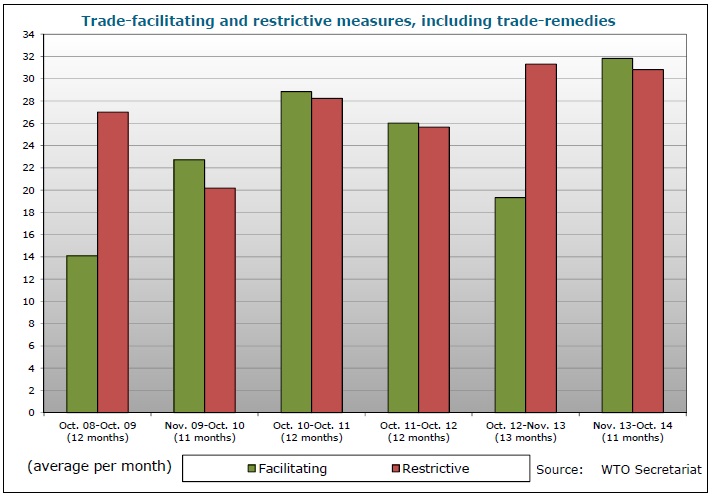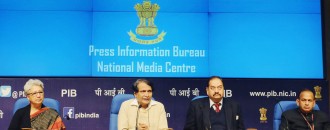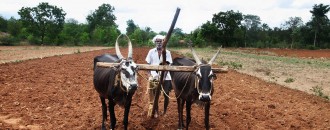
Rise in trade restrictions is concerning: WTO chief
 WTO chief Roberto Azevêdo speaking at Trade Policy Review Body, 8 December 2014
WTO chief Roberto Azevêdo speaking at Trade Policy Review Body, 8 December 2014 Roberto Azevêdo, Director-General, World Trade Organisation (WTO), has expressed concerns over increasing trade restrictive measures and has urged members to provide information over trade practices and reduce restrictions to help global trade recover. According to WTO estimates, global trade growth is expected to slowdown to 3.1% (down from previous forecast of 4.7%) in 2014 and recover slightly to 4% 2015. “Against this backdrop, recent trends in trade policy actions of members are a cause for concern,” Azevêdo said. He was referring to the increase in trade restrictions reported in the WTO’s annual report on “Developments in the International Trading Environment”. While introducing the report to the Trade Policy Review Body yesterday, Azevêdo said that trade-restrictive measures can hurt the global economy. “In a climate of global economic uncertainty the continued accumulation of trade-restrictive measures pose a clear risk,” he said. According to the WTO report, of the 2,146 trade-restrictive measures introduced since 2008, members have removed only 508 (or about 24%). Moreover, the number of new trade‑restrictive measures introduced during mid-November 2013 to mid-October 2014 has gone up to 168 with the average number of new trade-restrictive measures per month higher in this period than in any other period since October 2008, said the report. The WTO chief said that trade-restrictive measures and lack of transparency are leading to disputes between members. He urged members to avoid placing trade restrictions, eliminate existing trade restrictions, and contribute to enhancing transparency on trade procedures. “I think we should aim to deliver a higher level of transparency and accuracy of information in 2015,” he said. According to the WTO report, notification obligations in the areas of domestic support and export subsidies in agriculture remains below 50%; the percentage of members that do not submit notifications about Subsidies and Countervailing Measures Agreement has increased from 27% in 1995 to 44% in 2013; and the percentage of members that do not make any notification regarding state-trading enterprises has increased from 37% in 1995 to 66% in 2012. Azevêdo highlighted that transparency over trade restrictions must improve. “These provisions are essential to ensure that members have the necessary information to understand each other’s trade policies, to ensure that WTO agreements are properly implemented, and to avoid unnecessary trade disputes,” Azevêdo said. Azevêdo reiterated that while regional trade agreements (RTAs) have grown, the multilateral trading system remains important to enable trade facilitation, work on agriculture subsidies and to help the smallest and most vulnerable countries to benefit from global trade.
The WTO chief said that trade-restrictive measures and lack of transparency are leading to disputes between members. He urged members to avoid placing trade restrictions, eliminate existing trade restrictions, and contribute to enhancing transparency on trade procedures. “I think we should aim to deliver a higher level of transparency and accuracy of information in 2015,” he said. According to the WTO report, notification obligations in the areas of domestic support and export subsidies in agriculture remains below 50%; the percentage of members that do not submit notifications about Subsidies and Countervailing Measures Agreement has increased from 27% in 1995 to 44% in 2013; and the percentage of members that do not make any notification regarding state-trading enterprises has increased from 37% in 1995 to 66% in 2012. Azevêdo highlighted that transparency over trade restrictions must improve. “These provisions are essential to ensure that members have the necessary information to understand each other’s trade policies, to ensure that WTO agreements are properly implemented, and to avoid unnecessary trade disputes,” Azevêdo said. Azevêdo reiterated that while regional trade agreements (RTAs) have grown, the multilateral trading system remains important to enable trade facilitation, work on agriculture subsidies and to help the smallest and most vulnerable countries to benefit from global trade.
This article was published on December 9, 2014.





 to success.
to success.